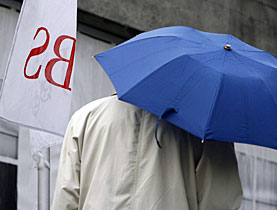UBS scraps contentious bonus system

Switzerland's largest bank, UBS, has announced it will no longer pay bonuses based on short-term goals after a public outcry against the "culture of greed".
From 2009, bonuses will be held back and forfeited if long-term results are not reached. Board members have waived bonuses this year after UBS racked up $44 billion (SFr52 billion) of subprime mortgage losses.
The bank is also looking into the possibility of clawing back performance-related pay already awarded to departed executives. Earlier this month, former chief executive Peter Wuffli said he would not take SFr12 million ($10.2 million) owing to him after he stepped down in 2007.
The move follows months of mounting pressure from shareholders, the public, banking regulators and government ministers. This intensified in October when the Swiss National Bank bailed UBS out with a SFr6 billion cash injection and agreed to cover toxic assets.
“UBS takes the shortfalls of its current incentive system seriously and is revising its variable compensation model for 2009,” the bank said in a statement.
Shares in the bank fell to an all-time low of SFr13.81 as news of the changes hit the market.
Not far enough
One large UBS shareholder, sustainable investment fund Ethos, welcomed the news after campaigning for years against excessive executive pay. However, the group said the move did not go far enough as it failed to set a cap on bonus payments.
“Consequently, Ethos has concerns that the new system will not prevent UBS from paying, in the future, remunerations that could be deemed to be excessive,” it said in a statement.
Shareholders will be invited to vote on the proposals at the next annual general meeting in early 2009.
The changes to the bonus system would principally apply to board members and executives, but also an as yet undefined group of “employees responsible for using risk capital and assuming significant financial risks.”
From next year, a maximum of one third of cash bonuses will be paid out straight away with the remainder held in a special account. This would only be awarded in full if the employees’ actions result in positive financial results for the bank.
Bonuses to be slashed
Compensation in the form of shares would only be released after three years, if targets were reached, and must be held by the employee for “several” more years before they can be cashed in.
“This should bring about a cultural shift in the company. Those who are rewarded will be those who deliver good results over several years without assuming unnecessarily high risk,” UBS said in its statement.
In future, the chairman of the board – currently Peter Kurer – will only receive fixed cash compensation and a fixed number of shares irrespective of performance.
In addition to board members and executives waiving their performance-related pay this year, bonuses across the board will be slashed for 2008. The exact sums will be worked out together with Swiss banking regulators.
All contractual notice periods will be reduced to six months to avoid a repeat of some executives being paid 12 months compensation after being sacked for poor performance.
swissinfo, Matthew Allen in Zurich
UBS endured a tough 2007 and things seem to have hardly improved in 2008, mainly as a result of the US subprime mortgage crisis.
In July 2007, chief executive Peter Wuffli stepped down following the collapse of the bank’s hedge fund Dillon Read Capital Management.
In October 2007, UBS said it would cut 1,500 jobs in its investment banking arm, including that of its head Huw Jenkins. Chief financial officer, Clive Standish, left at the same time.
UBS has written down about $44 billion as a result of the subprime mortgage market collapse. Chairman Marcel Ospel stepped down in April.
On October 16, the Swiss National Bank (SNB) agreed to put SFr6 billion ($5.29 billion) into UBS, in a move that aims to strengthen the bank’s capital base and reduce its balance sheet.
Based on an agreement with the SNB, UBS will transfer up to $60 billion of assets to a newly created fund entity and will capitalise the fund with equity of up to $6 billion.
The SNB will finance the fund with a loan of up to $54 billion, secured on the assets of the fund, taking over control and ownership of the entity.

In compliance with the JTI standards
More: SWI swissinfo.ch certified by the Journalism Trust Initiative












You can find an overview of ongoing debates with our journalists here . Please join us!
If you want to start a conversation about a topic raised in this article or want to report factual errors, email us at english@swissinfo.ch.